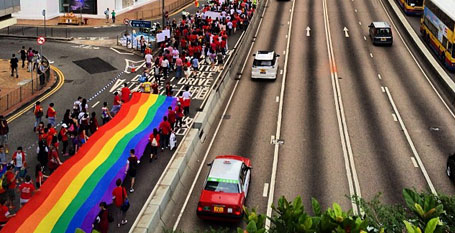Survey suggests majority of Hong Kongers support some rights for gay couples
A new study has been published by Hong Kong’s Center for Comparative and Public Law. The good news is that the report suggested that 74% of the Chinese autonomous territory’s people supported legal recognition for same-sex relationships. The bad news is that support for same-sex marriage still remains low.
Around two thirds of the people questions agreed that same-sex couples should have the same rights as straight couples when it came to housing, hospital visits, and inheriting property. However, only 27% completely agreed with same-sex marriage and another 12% somewhat agreed. 26% percent of the people asked thought same-sex couples should have none of the same rights as opposite-sex couples.
Hong Kong currently has no laws protecting LGBT people from discrimination. Researcher Holning Lau said that the results should encourage the government of the special administrative region to take steps in ensuring same-sex couples rights. “Our findings suggest that there is public support exploring [LGBT equality] options in Hong Kong,” he said.
Gay activist’s right to dance at 2011 rally upheld by court of appeal
A gay activist, known only as T, has fought down an appeal by the police challenging a ruling of last July. The original case goes back to a 2011 LGBT rights demonstration when the police barred T and another 100 participants dancing at the rally.
Police argued that the organisers had not obtained a license (under the Places of Public Entertainment Ordinance) for the dance ‘performance’, only for the demonstration. The Court of Appeal decided that the dancing did not merit the use of this ordinance.
Human rights lawyer Michael Vidler, who was representing T, expressed the great importance of the decision. “The reason why the police had fought to do this is because they had been trying to use a piece of subsidiary legislation to extend their powers to control demonstrations,” said Vidler. “This is an important case that has wider implications for all demonstrations, especially in the lead-up to Occupy Central.”
Hong Kong’s Security Secretary extends court’s order that allows transgender opposite-sex marriage
A Hong Kong Court of Final Appeal order that allowed a post-operative transgender woman to marry her male partner has been extended to include post-operative transgender men by Tai Tung-kwok, Hong Kong’s Security Secretary. The extension of the order is a sign that the Hong Kong government is making steps in recognition of transgender people.
However, the marriage laws of the region have not been changed the ruling still has limitations. The court order only applies to post-operative transgender people in opposite-sex couples and has not yet been successfully adopted by the government.
University of Hong Kong associate professor and a director of the World Professional Association for Transgender Health, Sam Winter, expressed his disappointment in the Hong Kong Government, saying “The government is taking the minimalist approach, the draft legislation is not inclusive or comprehensive enough.”

9 Jan 2014
Hong Kong LGBT Update | New Year News from the SAR
It’s been a busy start to the year in Hong Kong with news from the courts and the people suggesting that acceptance of the LGBT community is tentatively on the up. Let’s have a quick look at what’s been going on.
